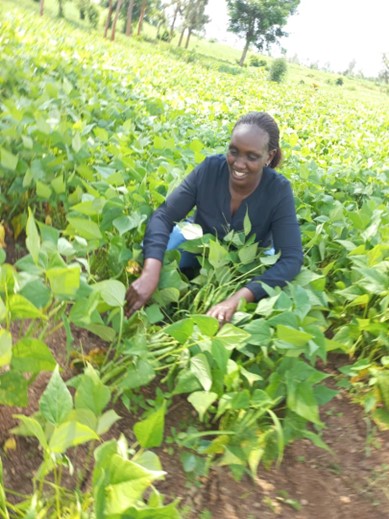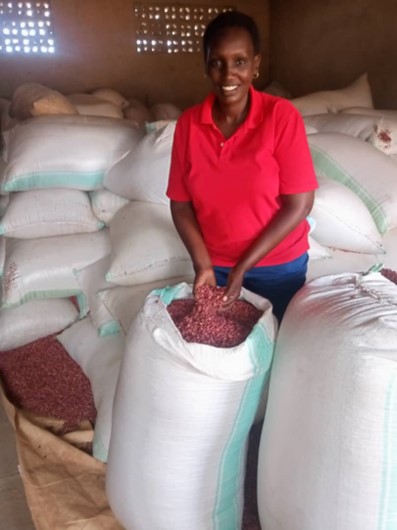by Emma Uwera, Edouard Rurangwa, Annuarite Uwera, Sylvia Kalemera, Jean Claude Rubyogo, Rachel Muthoni Andriatsitohaina
Emma Uwera is a young seed entrepreneur, wife, and a mother to three beautiful children, living in Muyumbu sector, Rwamagana District. After graduating in 2011, she got a contract to work with Rwanda Agriculture and Animal Resource Development Board (RAB) as bean program staff.
Emma continued her studies in bean breeding and graduated with a master’s in plant Breeding and Seed Systems from Makerere University and decided to take the plunge and start growing beans on her farm using both the theoretical and practical knowledge she had acquired. “The beans did very well.’’ She shared. “I decided to turn my knowledge into business and solve some of the challenges farmers were facing, such as limited access to seed, agronomic and climate information.’’
The Pan- Africa Bean Research Alliance (PABRA) supported me technically through training on Bean breeding during my classwork at the CIAT Kawanda Station in Uganda. Emma’s research was supervised by Dr. Claire Mukankusi, Global Bean Breeder. Some of the varieties she was working on was for MSc were bush bean, drought tolerant and bio-fortified. The varieties were also preferred by farmers and consumers because they are delicious, high yielding, with large- seeded grain size. “I was specifically interested in working with these varieties because of the challenges of malnutrition among smallholder farmers, expectant women, and children under five. Iron and zinc were an important need for this group.’’ She stated. PABRA and RAB supported me with basic seeds, farmer awareness and technical support during the study which I successfully completed.
She started growing beans on two hectares of leasing land near her village. She saved some money which enabled her to increase the leased land to five hectares to start seed multiplication as a contracted farmer with a private seed company. In 2019, Emma harvested 25 tons of beans; 10tons from her own farm and 15tons from the leased land. She was excited about this growth (see photo 1)
Last year, she started her own seed company to produce seed for sale. Her model yielded again 35 tons which included 10tons from her farm and 25tons from other out-growers. Since starting her company as a seed multiplier, her business targets three districts of Eastern Province where most farmers grow beans in March -June crop season. Because of the high demand for bean grain in the market, Emma has expanded her business model to contract 326 farmers (200 of them women). She started working with one employee but now she has employed two permanent ones with 60 women working on a casual basis. Despite the good progress, Emma pointed out some challenges that affect her seed business. The critical component being limited land hence she is contracting out growers to meet the demand. COVID 19 was a major hindrance especially since the restrictions demanded for social distancing hence, she could not access her farms on time. Most of her crops were lost as there was limited transport to the farm and the hired transport was expensive. Another major challenge is the climate change which affected her seed production.
She came into partnership with RAB and PABRA on seed business. Emma has gained good technical support from RAB in her seed production venture including packing seeds in small packs for smallholder farmers especially women to access certified seeds affordably.
“Before I started this seed business, my husband was the sole provider in the family. Now I can support him and contribute towards the wellbeing of the family.” She added: “I am happy that I can provide the first needs to my family and relatives.”
Recently she was licensed to produce RAB bean varieties. Her seed is premium because she can trace it from the source with the farmers she works with. She is excited about her work because of her contribution to the goal of the government of being self-sufficient in locally produced seeds without importation, supporting community by providing work to casual labors, with most of them are women.


